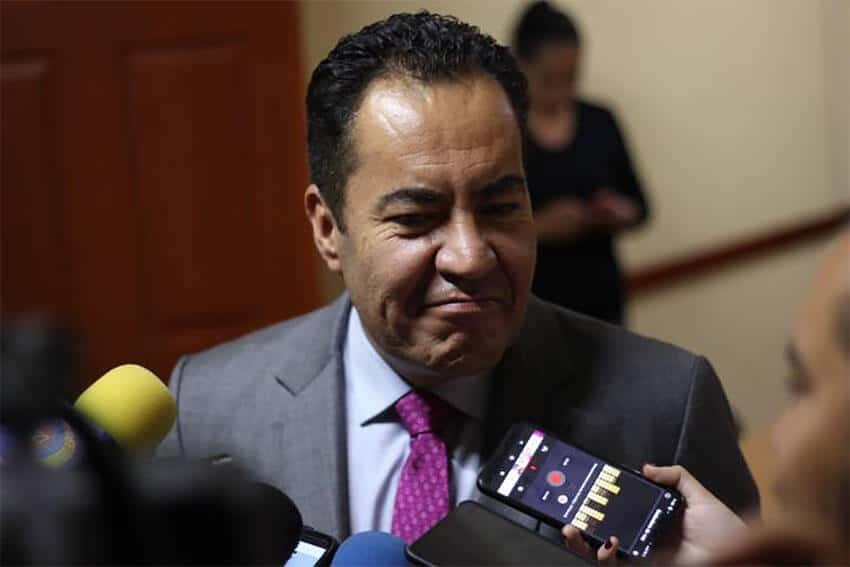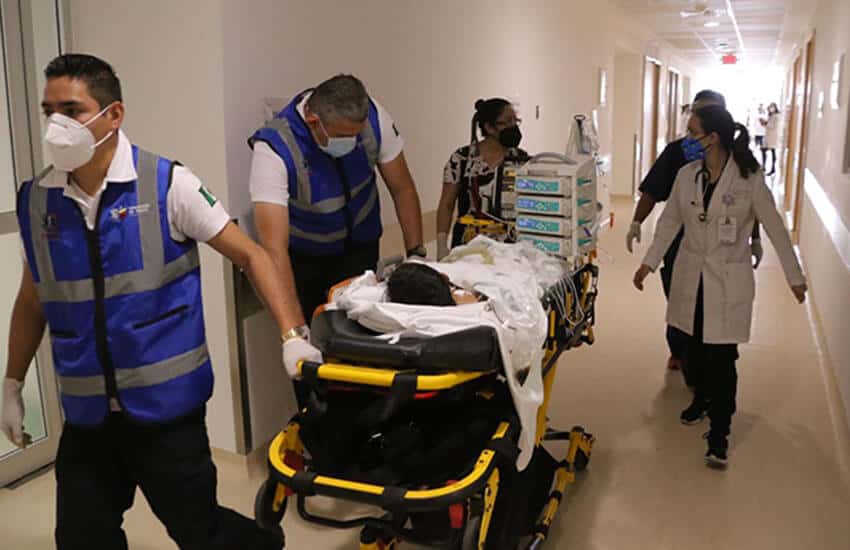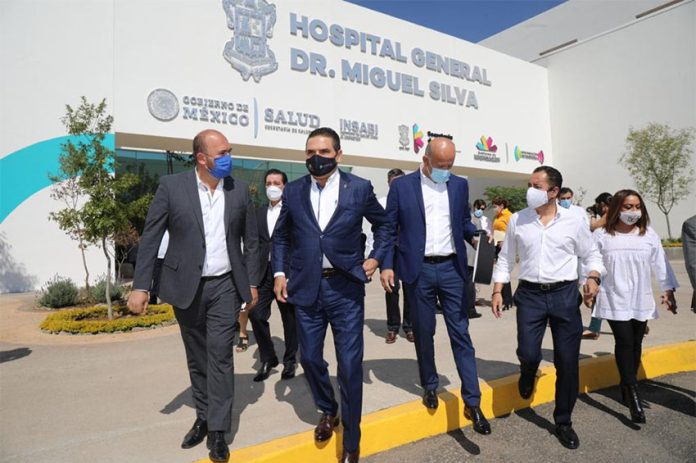An investigation has uncovered an apparent corruption scheme in which the previous Michoacán government awarded contracts for a hospital project to companies with links to political allies of former governor Silvano Aureoles.
Supported by a UNESCO journalism program and published by the newspaper Milenio, the probe detected irregularities in contracts worth over 1.1 billion pesos (US $54.5 million) in total, that were given to companies to complete work on the 3-billion-peso Ciudad Salud (Health City) project in the state capital Morelia.
Two new hospitals were built in the Ciudad Salud precinct, which opened in 2020: a 250-bed general hospital and a 100-bed children’s hospital. The federal government provided 2.6 billion pesos for the project – the largest completed by the Aureoles administration – while the other 400 million pesos came from the state government.
According to the UNESCO/Milenio investigation, some of the companies awarded contracts have links to political allies of Aureoles, who was the Democratic Revolution Party (PRD) governor of Michoacán between October 2015 and September 2021.
GCQ Construcciones, which was awarded a contract worth 376.4 million pesos (US $18.7 million), has links to Carlos Herrera Tello, the government secretary in the Aureoles administration and the PRD candidate in Michoacán’s 2021 gubernatorial election.

Samedic, a health sector supplier, won a contract worth 160 million pesos (US $7.9 million). It has links to Alexis Nickin Gaxiola, son-in-law of former Tabasco governor Roberto Madrazo, the Institutional Revolutionary Party’s candidate in the 2006 presidential election.
The investigation also raised questions about a contract worth 430.2 million pesos that was awarded to a consortium made up of Roth’s Ingeniería and Constructora Tzaulan. More on that later.
The Federal Auditor’s Office (ASF) detected a range of irregularities related to Ciudad Salud contracts, among which were payments for work not carried out and payments higher than those agreed to. The irregularities the ASF detected added up to 751.6 million pesos (US $37.4 million).
Of Aureoles’ political allies that benefited from Ciudad Salud contracts, Carlos Herrera appears to have the clearest conflict of interest.
Described by journalists Concepción Peralta Silverio and Ami Sosa as Aureoles’ right-hand man, Herrera was the legal representative of Quality Construcciones, a company that changed its name to GCQ Construcciones in 2016, the investigation said.
“His power was so wide-ranging that he could even sell the company,” the report said.

The investigation noted that GCQ had no experience in building hospitals, yet was awarded a 376-million-peso contract to complete work on the third stage of the general hospital. It formed an alliance with the company Constructora Pátzcuaro to complete the project.
The investigation cited four reasons why awarding the contract to GCQ represented a potential conflict of interest: Herrera is a former mayor of Zitácuaro and is thus prevented by a federal law from participating in bidding processes for government projects; one of GCQ’s owners is Herrera’s brother-in-law; the company was the subject of criminal complaints related to its failure to complete work on infrastructure projects in Tuxpan; and Herrera is a known friend of Aureoles and was appointed Michoacán government secretary in April 2019.
The investigation said that evidence suggests that the bidding process that resulted in GCQ winning the contract was not carried out in a fair way. Two competitors that presented lower bids were disqualified, allegedly because they made clerical errors on their applications. Those companies filed complaints about their treatment but they went nowhere.
A lawyer for GCQ said that Herrera was not a representative of the company when it was awarded the Ciudad Salud contract. The company was awarded two other lucrative contracts during the six years Aureoles was in office.
Michoacán-based construction companies told the investigative journalists that contracts were routinely awarded to the former governor’s favorite companies, which resulted in other firms going bankrupt due to a lack of work.
One construction company chief who asked not to be identified said that his firm did not participate in bidding processes because they were “rigged.”

The only Ciudad Salud contract that wasn’t awarded as a result of a (supposedly) competitive tender process went to Samedic, which supplied medical equipment to both the general and children’s hospitals.
Nickin, Madrazo’s son-in-law, jointly owns another company with one of the Samedic owners, the UNESCO/Milenio investigation said. The journalists didn’t point out any explicit links between Nickin and Aureoles.
They did say that Samedic subcontracted smaller companies to install medical equipment in the two hospitals, and that one of the subcontractors had complained about not being fully paid.
The report also said that Samedic was awarded four other contracts worth 338.5 million pesos during the six-year term of the Aureoles government.
The investigation raised a number of concerns about the bidding process that resulted in the Roth’s/Tzaulan consortium being awarded a contract for the construction of the second stage of the children’s hospital. It said that another company with the same owners as Roth’s, called Constructor Erlort y Asociados, was permitted to participate in the same process, resulting in a “clear simulation of competition.”
One company, Luviano, which built the first stage of the children’s hospital, was disqualified for presenting a bid higher than the authorized budget, while Edificaciones Tres Ríos was ruled out due to clerical errors on its application.
The investigative journalists questioned why the Roth’s/Tzaulan consortium was awarded the contract when the former company had no experience in building hospitals and the latter failed to meet the deadline for the construction of a hospital in Ciudad Madero, Tamaulipas.
The consortium was 17 months late in completing the second stage of the Ciudad Salud children’s hospital, and the project ended up costing 37% more than the amount specified in the original contract.
The two companies – which were paid a total of 590.3 million pesos, or 160 million pesos more than the amount originally agreed – were not sanctioned in any way for failing to meet the scheduled deadline. The second stage’s final price tag made it the most expensive Ciudad Salud project.
The investigation named the owners of Roth’s and Tzaulan but didn’t provide any details about the relationship they had with Aureoles.
With the exception of one company – ICA – the firms awarded contracts to work on the Morelia healthcare precinct had their biggest ever payday thanks to their association with the Michoacán government led by Aureoles, according to the civil society organization Poder, which has a public contracts database.
Despite the juicy contracts, some of the work on the two hospitals was substandard, the UNESCO/Milenio investigation said. The hospitals have been flooded by rain and wastewater and there are concerns about the foundations of the children’s hospital, it said.
The investigation said that current Michoacán Governor Alfredo Ramírez Bedolla is in a position to hold the previous government to account, but noted that he is in an uncomfortable situation because his health minister, Elías Ibarra Torres, worked for the Aureoles’ administration in the same position and his signature appears on some of the contracts in question.
With reports from Milenio
